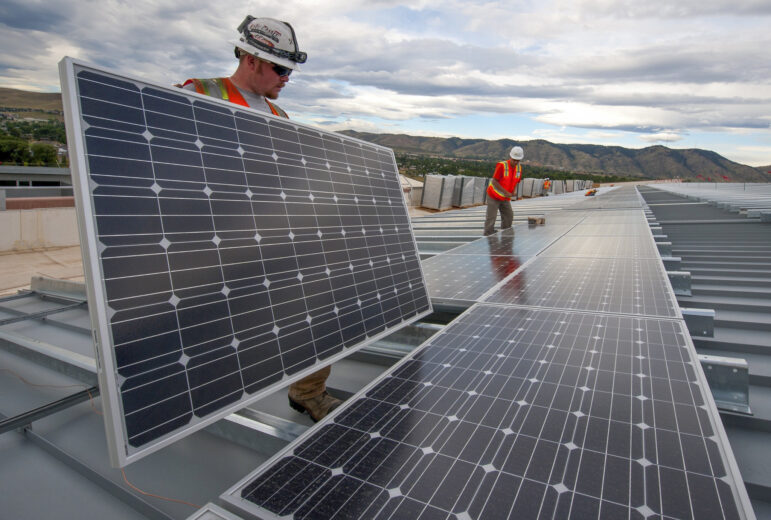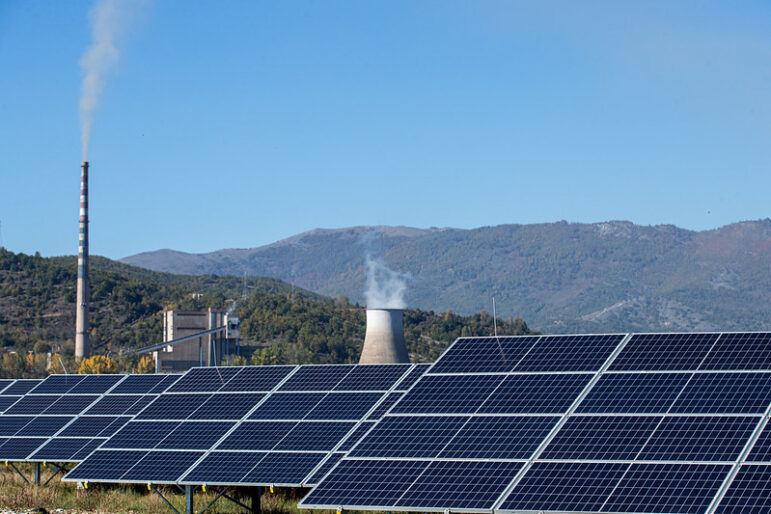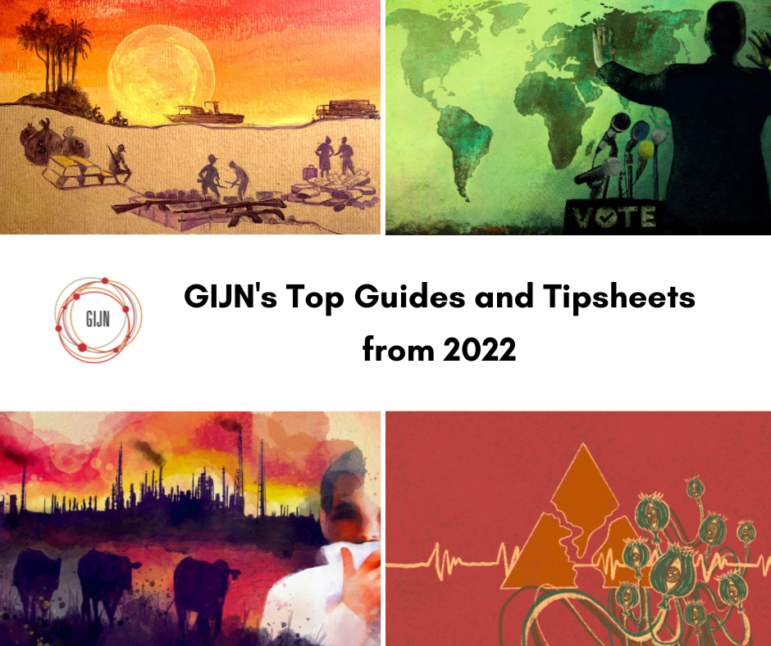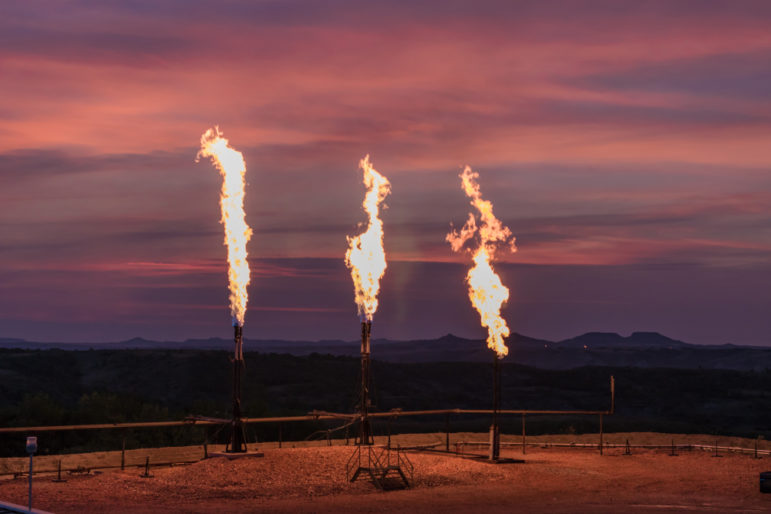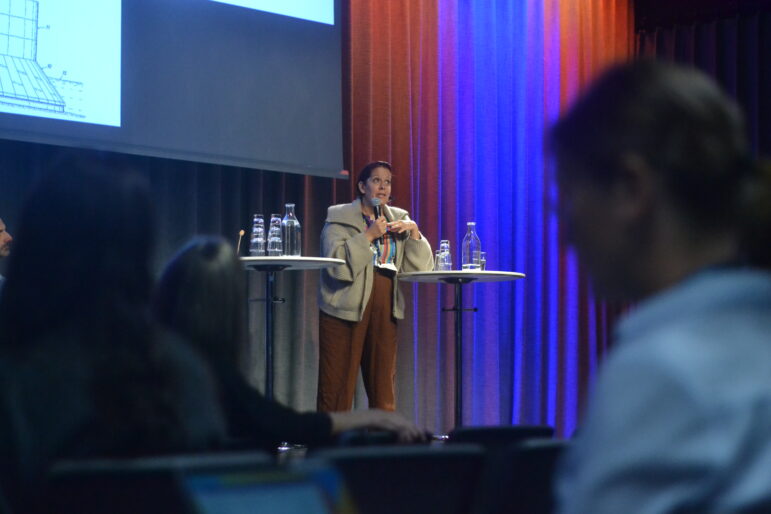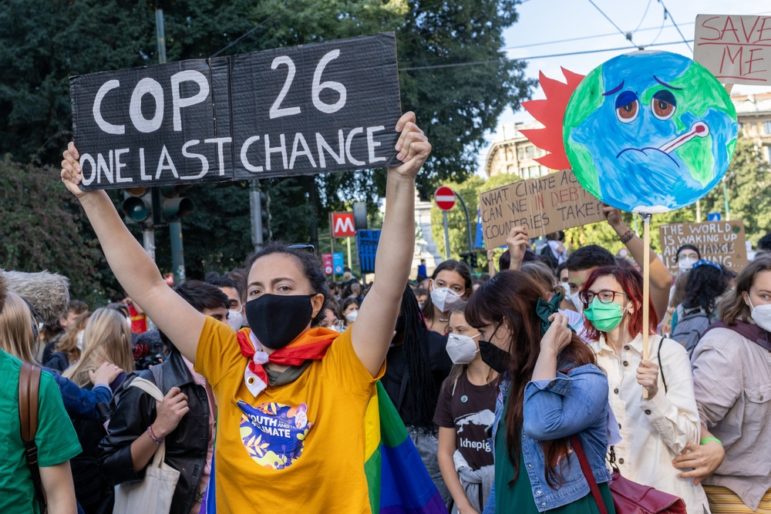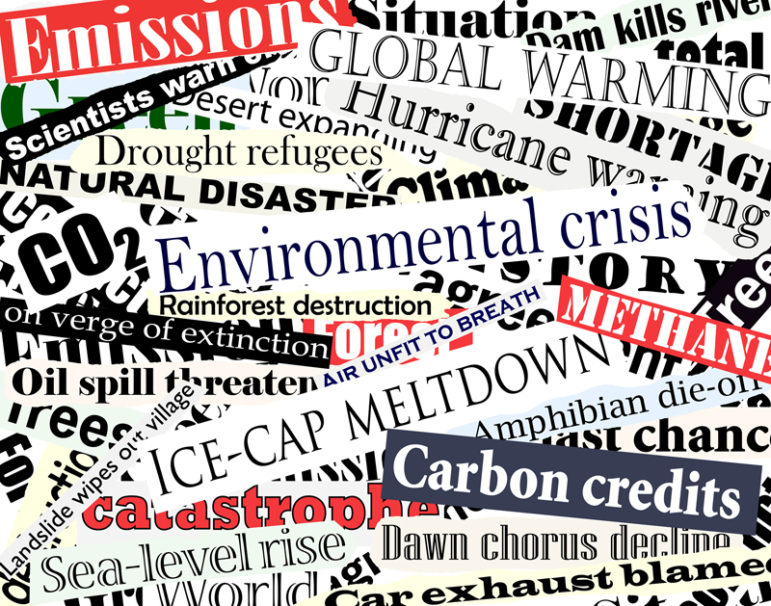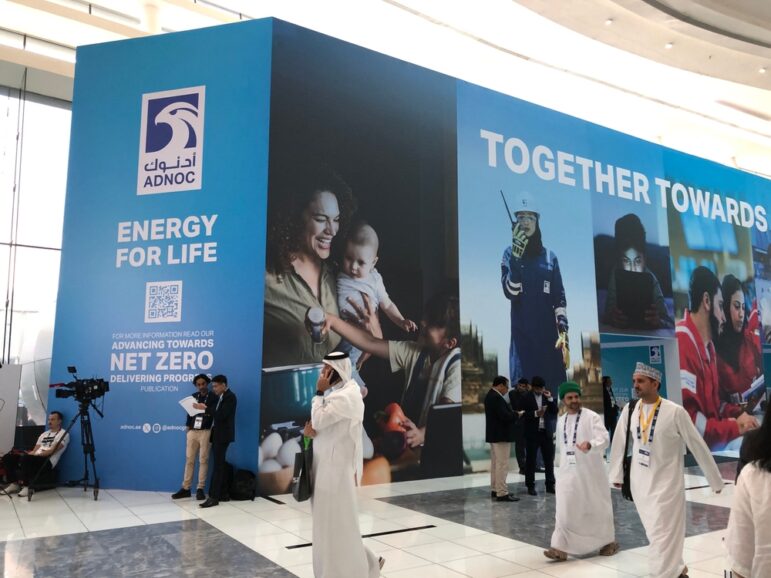

A joint investigation between the Centre for Climate Reporting and the BBC uncovered talking point slides produced by the UAE, COP28's host country, that promoted fossil fuel deals between Adnoc, the UAE's national oil company, and more than a dozen countries attending the world's premier climate summit. Image: Shutterstock
How a Small Nonprofit Newsroom Broke the Oil Deal Pitching Scandal at COP28
A new blockbuster investigation by the Centre for Climate Reporting (CCR) and the BBC reports that the United Arab Emirates host team for COP28 — the UN climate summit currently underway in Dubai — prepared talking points to strike new oil deals with 15 nations in pre-conference meetings. Based on a leaked trove of briefing documents, the investigation reports that COP28 president Sultan Al Jaber — who is also CEO of the UAE’s national oil company and the state renewable energy firm — was issued briefing notes that originated with his country’s fossil fuel firms. The alleged goal: to push lucrative oil and gas deals around the globe for the UAE under the cover of the world’s premier conference to fight climate change.
In a press conference on the eve of COP28, Al Jaber strongly denied the investigation’s claims. “These allegations are false, not true, incorrect, and not accurate,” he insisted. “I promise you, never ever did I see these talking points that they refer to or that I ever even used such talking points in my discussions.” He did not, however, refute the authenticity of the documents.
A BBC spokesperson responded to the denial by saying: “Our investigation was rigorously researched according to the highest editorial standards.”
The story reflects an important new focus area for investigative journalists: probing infiltration, conflicts of interest, and greenwashing by polluters at major environmental events. In 2021, data reporters at Global Witness revealed that oil lobbyists represented the single largest delegation at the COP26 event in Glasgow — outnumbering the combined delegations of the eight countries most affected by the effects of climate change. The COP28 story also lays bare the inadequacy of UN efforts to limit the oil and gas industry’s influence at climate events, such as a new rule, instituted this year, that fossil fuel lobbyists must declare their affiliation to register for the event.
Insider Account of the Investigation
In an interview with GIJN, Ben Stockton, the lead reporter on the oil deals investigation, explains that the exposé was based on 150-plus briefing documents and more than two dozen internal emails leaked to him by a whistleblower “who was concerned about the direction COP28 was taking.” Stockton reveals that the cooperation of a second whistleblower was crucial both to verifying the authenticity of the documents and for convincing the BBC to co-publish the exposé with CCR, a small UK-based investigative nonprofit group.
“I’ve been working on COP28 for about a year, so when we were looking to verify the leaks, I could compare them to other internal documents I’d already seen,” says Stockton, who was for years a watchdog journalist with the UK’s Bureau of Investigative Journalism, before working with CCR. “I felt the documents were legit based on those comparisons, but we realized that would likely not be enough. So we were fortunate to be able to corroborate the contents of the documents with a second source who was also concerned about COP, and who was a huge help in getting us across the line, and winning the BBC’s full confidence.”
- Slide on China’s COP28 representative from UAE’s talking points presentation for COP28 President Sultan Al Jaber. Image: Courtesy of the Centre for Climate Reporting
- Additional slide from UAE talking points presentation about China’s interests at COP28. Image: Courtesy of the Centre for Climate Reporting
- This slide details fossil fuel projects and opportunities between UAE’s state energy corporations — Adnoc and Masdar — and China. Image: Courtesy of the Centre for Climate Reporting
It is important to note that Stockton and his team do not know what was actually said in the many pre-COP28 bilateral meetings targeted by these briefings, and that, in general, the evidence in the investigation does not contradict Al Jaber’s assertion that “I never… even used such talking points in my discussions.”
“We were confident that these documents had been prepared for Al Jaber by the COP28 team, and that the talking points had come directly from [the commercial companies he runs],” Stockton emphasizes. “The next step was to try to establish to what extent these were actually used in meetings, and we and the BBC reported on one instance where one country had followed up on commercial discussions that happened in a meeting. CCR also reported another source who told us commercial discussions had been brought up in another meeting. But, beyond that single instance and the other allegation, we were not able to confirm exactly how many times Al Jaber had raised commercial interests in bilateral meetings.”

Months before the climate summit, COP28 President Sultan Al Jaber (left) embarked on a worldwide tour, meeting with top-level diplomatic officials as part of his hosting duties. Here, Al Jaber is seen meeting with European Union Council President Charles Michel in June 2023. Image: Shutterstock
Still, the story exposes the breathtaking conflicts of interest that increasingly plague global environmental events. In response to the investigation, a New York Times piece quoted one environmental advocate bemoaning the irony involved: “At this point, we might as well meet inside an actual oil refinery.” (Relatedly, GIJN has also produced a Reporting Guide for Holding Governments Accountable for Climate Change Pledges.)
Stockton says the stature offered by the COP28 presidency granted Al Jaber special access to global decision-makers. “[He went on] this world tour, talking to these different government representatives, royals, and the UN General Assembly,” Stockton explains. “We quote a source in the story who says these doors simply would not be open to a company CEO, or even a climate envoy from the UAE.”
Disputing the Science
A separate COP28 investigation from CCR and the Guardian — by Stockton and Guardian environment editor Damian Carrington — revealed jarring recent remarks by Al Jaber that appeared to echo climate denialist talking points. This story surfaced Al Jaber’s comments at an online event in November, in which the Emirati official was heard claiming that there is “no science” behind the consensus position that a phase-out of fossil fuels is required to slow global heating to 1.5C. His assertion directly contradicts UN Secretary-General António Guterres, who, on COP28’s second day, called for the total phase-out of fossil fuels to reach that temperature goal
In response, a spokesperson for COP28 instead suggested that the story misrepresented Al Jaber’s position. “The IEA and IPCC 1.5C scenarios clearly state that fossil fuels will have to play a role in the future energy system, albeit a smaller one,” the spokesperson claimed. In a surprise press conference at the event, Al Jaber added: “I have said over and over that the phase down and the phase-out of fossil fuel is inevitable.”
Finding the Whistleblower with an ‘Outside-In’ Approach
Stockton says his methodology for the joint BBC investigation was directly inspired by a session at GIJN’s 2019 Global Investigative Journalism Conference in Hamburg, in which New York Times reporter Russ Buettner explained how he used an “outside-in” approach behind his Pulitzer Prize-winning Trump tax scams story.
“He talked about these concentric circles of sources, and working inwards from the outside,” Stockton recalls. “He showed me that the people who you think know most about an issue — like the closest advisors to a COP president — are probably the people least likely to talk to you. So look for the people in the very outside circle and collect as much public information as you can about that topic, and slowly work your way in — and get introduced to people closer and closer to the middle. If you have just one chance to speak to a person on the inside, you need to know the issue inside-out.”
Stockton also used this methodology to unearth sources for other, increasingly complex stories ahead of COP28. He began with the simplest question in January 2023: Given that COP28 would be hosted by a petrostate, would local fossil fuel company employees be given roles within the COP28 host team?
And he used the simplest fact-gathering strategy to check. He started by typing “site:LinkedIn.com,” “COP28,” and the name of the UAE state oil company, “Adnoc,” into Google, and slowly built a database of conference staff who were either hired or temporarily transferred from the oil company. He says his editor — CCR founding director Lawrence Carter — was then shown a job ad from a recruiter for a diplomatic engagement position for COP28 that had the Adnoc watermark on the document. That piece — also in partnership with the Guardian — was a simple data story, but Stockton says it helped signal CCR’s commitment to the conflict of interest issue to potential sources in and around the COP28 team.
He hoped these types of data stories would eventually shake loose human sources — and they did.
Dealing with Leaks from a Repressive State
Being a whistleblower is stressful anywhere, but, as Stockton points out, revealing inside information from a country like the UAE represents another level of anxiety, and requires an extra level of care from investigative reporters.
“There is a high degree of risk speaking out in the UAE — freedom of expression is incredibly limited,” he notes. “We knew it would be a struggle. For me, the fact that people have spoken out at all shows just how concerned people in and around the COP28 team were about those blurred lines between COP and Adnoc.”
He adds: “We were very careful about how we were communicating — encrypted messaging, encouraging the use of VPNs. I’m clear with sources who want to do the right thing that my main priority is their security. It’s important to hear and understand their particular concerns and motivation, and, at the first meeting, to not demand: ‘Send me everything you’ve got.’ It’s about building a relationship of trust, and helping them understand the steps you are taking to protect their identity.”
Lessons learned from the COP28 oil deal briefings investigation include these:
- Start to dig for sources at least a year ahead of the event. “Starting early is key, and immersing yourself in that world is important — knowing the characters at the heart; people who are not public figures but who are influential in the team,” says Stockton. “ Our competitive edge on this story is that we had no obligation to publish anything else; no daily stories to worry about – we are solely focused on deeply reported stories we choose.”
- Consider people-finding tools like RocketReach and Pipl. “Looking for ex-employees is really handy,” says Stockton. “That’s primarily LinkedIn, but also people who tell you that people have left, even though LinkedIn might still tell you they’re still employed. We used RocketReach for finding contact info for people, and Pipl as well. And just reaching out to people who you think will tell you nothing, but who do.”
- Publish shorter, initial stories to attract sources for the longer, later ones. “If people are looking to come forward, they will know you are actively looking into the issue if you’ve already run stories on the topic,” Stockton explains. “We are one of a small number of news organizations, including the Guardian, the FT, and Politico, who have consistently done enterprise reporting on the issue — but, unlike those, we are a very small nonprofit. But we found that, for us, the ability to convince people to speak is just sticking to the topic. There’s more to come. The day we published this story, there was a huge amount of interest from outlets all around the world.”
- Use the standards of major media partners to up your confirmation game. “Once we got these documents, we knew we had a pretty big story — and we felt it met the bar to approach the BBC,” Stockton says. “We got the documents, but there was still more to do, like reaching out to the countries mentioned in the briefings and going to officials for comment, and BBC staff helped with those elements. But we knew we needed more to convince an outlet like the BBC to actually publish, and we got that extra confirmation.”
- Try tools like PimEyes to track officials in the background of public images. Stockton says group photos at environmental events can be a goldmine for conflict-of–interest investigations, thanks to powerful reverse image tools. “We used PimEyes, which is this AI-driven service that is scary-powerful. I knew from a source that one advisor to the COP28 president had been on a visit to the Pope and had been on a TV business broadcast, and I got a little blurry image of his head. I put it into PimEyes, and it just churned out a load of images that were good story leads.”
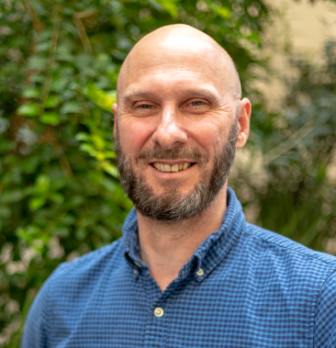 Rowan Philp is GIJN’s senior reporter. He was formerly chief reporter for South Africa’s Sunday Times. As a foreign correspondent, he has reported on news, politics, corruption, and conflict from more than two dozen countries around the world.
Rowan Philp is GIJN’s senior reporter. He was formerly chief reporter for South Africa’s Sunday Times. As a foreign correspondent, he has reported on news, politics, corruption, and conflict from more than two dozen countries around the world.

